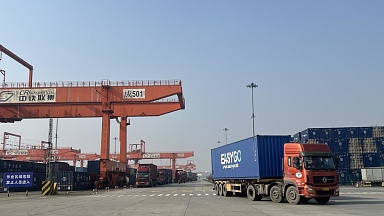The restrictions on the transportation of dangerous goods through China have been a major challenge for various industries. With the growing demand for electric cars, there is a growing demand for batteries. And not only for electric cars; think of electric bicycles, laptops or households. This is a booming market, and this market is eager to see the restrictions lifted.
Until now, the Chinese government has had a firm stance on the issue. The risks are too high and the stakes too low, so it seems. Over the years, many have tried to influence this policy, carriers and shippers alike. Last year, it almost looked like the restrictions would be lifted for certain types of goods, but in the end, the policy change did not occur. It is not certain if something will change in 2021, but the ambitions are there, Hinne said.
Optimism for 2021
The CEO explained that DB Cargo Eurasia (DBCE) is looking into the future with optimism and appetite for more developments. He wishes that 2021 will be the year of more opportunities. Additionally, the elimination of bureaucratic procedures that incommode Eurasian transportation would be certainly welcome. Above all, health among all employees of the rail industry is considered the most valuable good for the coming year, he noted.
DB Cargo Eurasia evaluates 2020 as a successful year despite the various difficulties caused mainly by the pandemic. COVID-19 might have impacted the majority of businesses worldwide. However, Hinne believes that with regards to rail freight transport it offered more than it took. According to him, Eurasian traffic witnessed large increases since China Railways announced that for 2020 it transported nearly 12,000 trains, an increase of 3,000 trains compared to the previous year. The rail market has grown significantly, and 2021 is possibly going to boost it even more.
Kaliningrad
During 2020 DB Cargo Eurasia saw its revenues reaching and exceeding the amount of 100 million euros. Numbers almost doubled since last year when the revenue was around 58 million euros.
Understandably, the company’s products and services are the ones responsible for this auspicious increase. Considered among the highlights of 2020, the starting of their first service via Kaliningrad was crucial both for the company and customers. Since last April, the Kaliningrad route provided a great alternative to the frequently congested Malaszewicze/Brest passage. Additionally, it evolved in a very stable connection between Xi’an and Rostock, offering transit times amid 11 and 13 days.
Other projects
At the same time, DBCE put into operation some other important services. For instance, the route from Immingham (UK) to Hefei has been established since June. Passing Hamburg in Germany the autoparts are transported to China within eighteen-twenty days.
Later on, in September, it began operating a test train with high potential for more volume from Hefei to Dourges in France. This train is transporting cooling elements. Ultimately, almost a month ago, the company provided another connection between Yiwu and Liege with transported e-commerce. The link has already seen three trains travelling between the two destinations.
Looking ahead
For 2021, as the European Year of Rail, DBCE expects the shares of rail freight transportation to be increased. The coming year seems ideal for such a development if we take into account the results of the last three years, which are estimated to continue and intensify more. Moreover, the company is looking forward to better cooperation between partners of the Eurasian corridor because this is the only way to get the best possible results in the market.
Hinne also underlined the fact that from its side, the company is intensively working on expanding, improving and creating new products. For example, DBCE is currently working in close cooperation with its sister company DB Systel to develop block train technology through digitalisation. With attention turned to customer service, and the decrease of transit times on the Eurasian corridor, any improvement in the sector of block trains could have an impressive impact.
Sustainable growth
While referring to the broader rail sector, Hinne highlighted the fact that everyone should be aware of the strength that rail has. The industry is providing environmentally friendly products in a period that everyone is discussing the human environmental footprint. Consequently, if everyone keeps this in mind and contributes in the best way, rail freight will manage to grow sustainably in the following years.
Watch the interview
Do you want to watch the interview in video? Watch it below:




